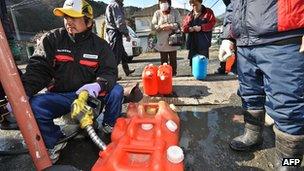Japan consumer prices rise spurred by higher fuel costs
- Published

Japan's consumer prices rose in April, spurred by rising fuel costs, but growth remained below the central bank's target, official data has shown.
Prices rose by 0.2% from a year earlier, as fuel and energy costs jumped 4.7%.
Energy costs in Japan have risen after it shut all of its nuclear reactors in wake of last year's quake and tsunami.
However, prices excluding those of fuel and food fell, indicating that deflation remains a problem.
"The hope of Bank of Japan that deflation is already subsiding and a positive demand cycle is evolving seems premature," Martin Schulz of Fujitsu Research Institute told the BBC.
Unsustainable demand
Unlike many other countries in the region, Japan has been hurt by deflation, or falling prices, for best part of the past decade.
While that may be good news for shoppers, falling prices hurt the economy as companies and consumers tend to put off purchases, in hope that prices will continue to fall and they may get a better deal down the road.
Analysts have said that a steady rise in consumer prices is key to Japan's economic recovery and the Bank of Japan has set a target of 1% price growth.
Though prices have been rising for the past three months, analysts said that the growth was due to factors that were actually hurting the economy or were not sustainable in the long run.
"Most of the price increases are driven by higher energy costs. These are actually going overseas, as fuel is being imported, so this is an overall negative for the economy," said Mr Schulz.
"A lot of the increase in prices is also being driven by government programmes, reconstruction and consumer incentives, this kind of demand is not sustainable."
- Published18 May 2012
- Published15 May 2012
- Published4 May 2012